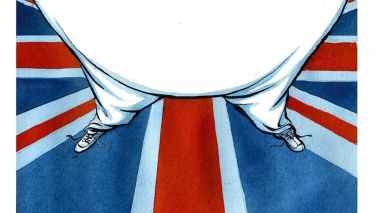Inevitably, at this time of year, it has been a fortnight dominated by cricket. It began in extraordinary fashion. The Oval, where I was working, became the scene of a unique event in the sport: the first time that a Test match had been forfeited by one team refusing to take the field. The team was Pakistan and the umpire who sparked off the row was Darrell Hair, after he accused the Pakistan team of cheating. In the commentary box we scoured hours of footage to try to find any visual evidence of ball-tampering, but we couldn’t find a thing. Since then I have not changed my opinion: if there was ball-tampering, it was minor and therefore could and should have been handled with far greater sensitivity by the umpire in question. A quiet word with Inzamam-ul-Haq, at the point at which Hair was concerned, and none of this would have happened. All kinds of nonsense followed the ‘conclusion’ of the match. That cricket was in crisis and wouldn’t recover. The truth is that cricket has been, and always will be, the most controversial of games, and this episode is simply a further example. The so-called ‘spirit of the game’ was, in reality, a Victorian creation in response to a game gone sour when match-fixing, bookmakers and betting dominated the game in the early 19th century. The day ended walking back to the hotel with Michael Holding, the great West Indian fast bowler, and wondering how a man so much older than me can still move with so much more grace.
Match-fixing, which came to the fore a decade ago for the second time in cricket’s history, was a far greater crisis than the current one. At least if the Pakistan team were ball-tampering, they were doing it to try to win the game, rather than lose it, which is what the Pakistan team of the mid-1990s were regularly accused of doing. It struck me that a decade ago such an ending to a Test match would automatically have given rise to suspicions of fixing. Yet despite the outrageous betting patterns, when England lurched from rank outsiders to favourites in the time that it took Pakistan to register their protest, nobody suspected foul play at all. In one sense, that says much for the way that cricket — unlike other sports such as racing and football — has managed to clean up its act. Coincidentally, the final act of the player at the centre of the match-fixing crisis of the 1990s — the South African Hansie Cronje — came to a close this week. An inquiry concluded that his death, brought about when a plane crashed into a mountain, was due to pilot error, not foul play. There were as many conspiracy theories surrounding Cronje’s demise over there as there have been about Diana over here. Rest in Peace.
Speaking of betting, I have been keeping a sharp eye on the Millennium Dome story, which again sprang to prominence this week when it emerged that Philip Anschutz’s company, AEG, has begun work in anticipation of winning the bid for the first Las Vegas-style mega-casino. Local faith leaders were upset that AEG had misrepresented their thoughts on the matter: well, the contract for the first super-casino is worth a great deal. Amid the hullabaloo about the moral rights or wrongs of giant casinos, few have stopped to consider whether they will actually do what John Prescott wants them to do — that is, bring about massive urban regeneration. The example of Atlantic City in the US has shown that mega-casinos are not necessarily good tools for urban regeneration; after all, the whole point of the casino-resort is that once the punters are ensnared in the environs of the casino, they should be offered every amenity so that there is no excuse to escape. It follows that giant casinos are bad neighbours for urban businesses. It seems to be that the liberalisation of the gambling laws — stripping away the basic tenet of the 1960 Gambling Act, that gambling should be allowed, but not encouraged — is not a very smart move.
The cricket story took an extraordinary twist at the end of last week. I received a call early on Friday morning which said simply that the press conference scheduled for that afternoon would ‘knock me off my feet’. It certainly did. I don’t think I’ve ever watched a press conference before where the journalists present had no inkling of what was to come. But when it was revealed that Darrell Hair had offered to go quietly in return for $500,000 it is fair to say that we were all knocked off our feet. The turn of events, especially for one man — Hair — is extremely sad, but it is a damn good story. Following the revelation of the emails, I have far more sympathy for Hair, who has been hung out to dry by his employers, the ICC. For much of the cricket season, which until this point had been a rather dull affair, the journos have been moping about with not much to write about. Now there is too much, and Friday’s press conference came only three hours before the annual cricket writers’ knees-up on Park Lane. Hurried copy.
Book publicity ends the week, with slots on the Today programme and interviews with the Sunday Times and the Financial Times. The explosive cricket story makes it a bad time to be doing book publicity. The whole point of writing a book about gambling was to branch out from writing about cricket. But nobody in the present climate wants to speak to a former England captain about gambling. Sportsmen can find it hard to escape their former lives.
Gambling: A Story of Triumph and Disaster is published by Hodder & Stoughton (£18.99) on 7 February.





Comments